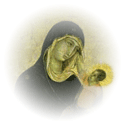Metropolitan Museum of Art in New York has acquired the last painting by Duccio di Buoninsegna, a devotional panel of the Madonna and Child from the Stoclet family in Brussels, Belgium for around $45 million, making it the single most expensive object ever purchased by the museum. Offered privately by the Stoclet family through Christie's, the 27 x 21 cm (10 5/8 x 8 inches) Madonna and Child had been previously offered to the Getty but had been turned down as 'too expensive,' for the potential buyer - the Louvre Museum in Paris which owned no works by the founder of Sienese painting.
 The last painting by Duccio di Buoninsegna (1278 - 1318/1319) was bought by
Adolphe Stoclet family in 1923 from the
Stroganoff collection in Rome. The painting called after the owners "the Stoclet Madonna" or "the Stoclet Duccio"
was originally the center of a tabernacle, the wings of which have long disappeared.
The Stoclet Madonna has been seen by very few scholars and has never been publicly
exhibited and was a notable no-show at the 2003-2004 Duccio exhibition in Siena
where it had been tentatively promised.
The last painting by Duccio di Buoninsegna (1278 - 1318/1319) was bought by
Adolphe Stoclet family in 1923 from the
Stroganoff collection in Rome. The painting called after the owners "the Stoclet Madonna" or "the Stoclet Duccio"
was originally the center of a tabernacle, the wings of which have long disappeared.
The Stoclet Madonna has been seen by very few scholars and has never been publicly
exhibited and was a notable no-show at the 2003-2004 Duccio exhibition in Siena
where it had been tentatively promised.
Certainly, Duccio painted this beautifully preserved masterpiece under the influence of medieval Greek paintings, however, unlilke to Bizantine art, Duccio's relationship between Mother and Child is described in more naturalistic, gentle manner. Duccio brought to this rigidly, schematic Byzantine manner the spirituality, grace and liveliness of Gothic art.
Autograph paintings by Duccio are exceptionally rare, and only a few are in collections outside of Siena: The National Gallery of Art, Washington, the Kimbell Art Museum and the Frick Collection, New York, all own panels from the great Maesta altarpiece, while the Museum of Fine Arts, Boston owns a beautiful devotional triptych of the Crucifixion with Saints. There is still one more Duccio in private hands - a Crucifixion in a private collection in Siena, it cannot be legally exported.
The Stoclet Duccio as being the property of Stoclet family had the additional advantage of being blissfully free of export problems, unlike great pictures held in Italy.